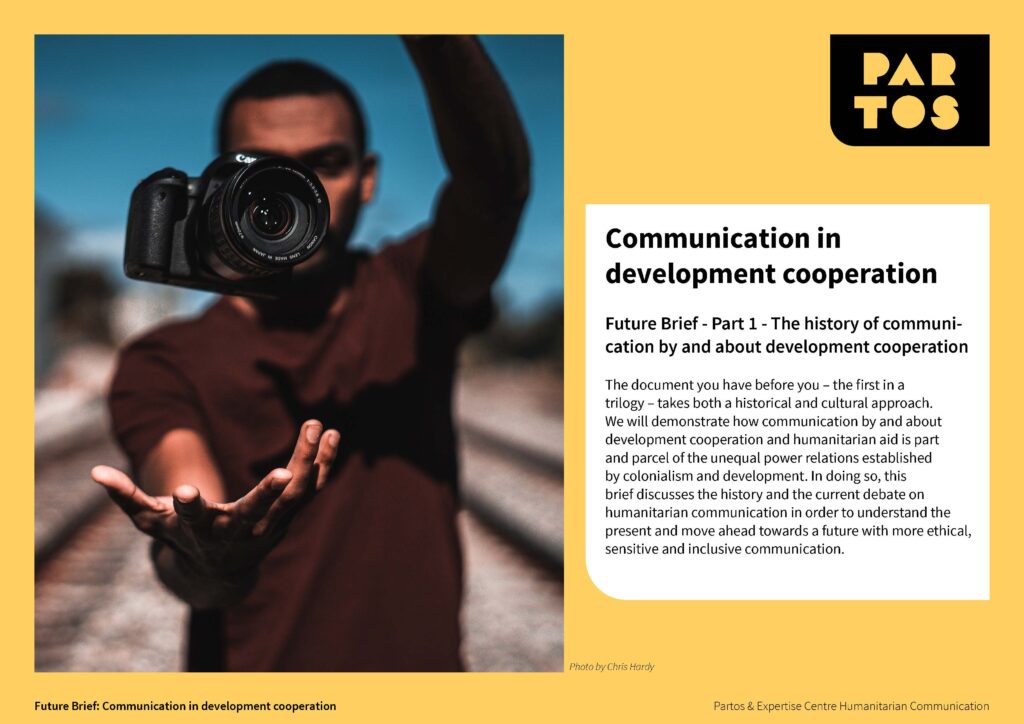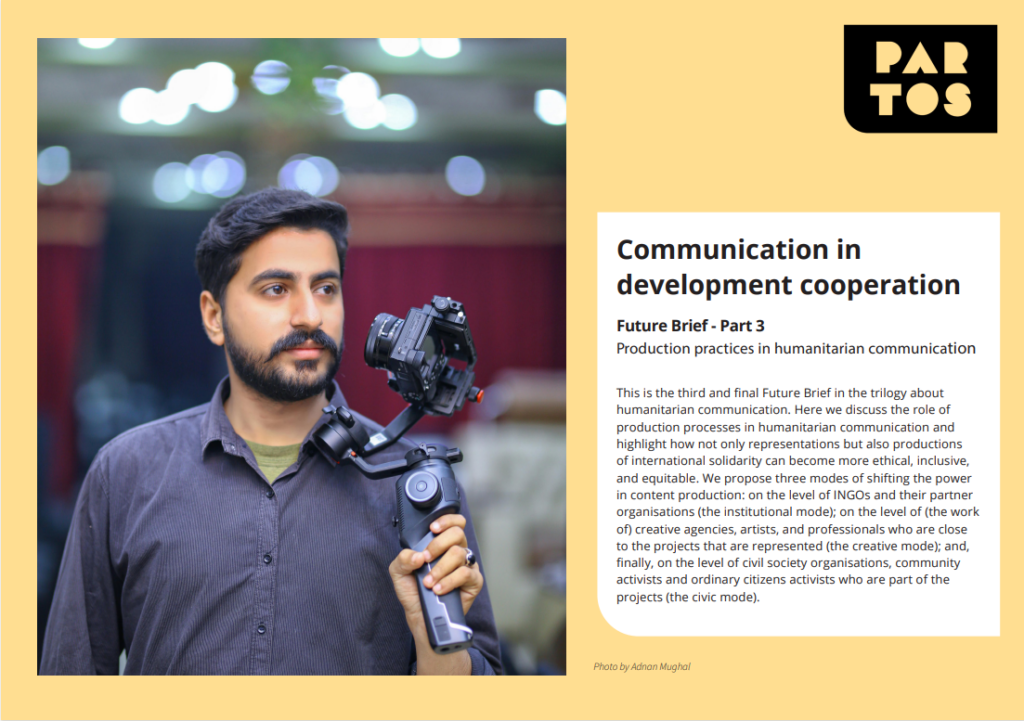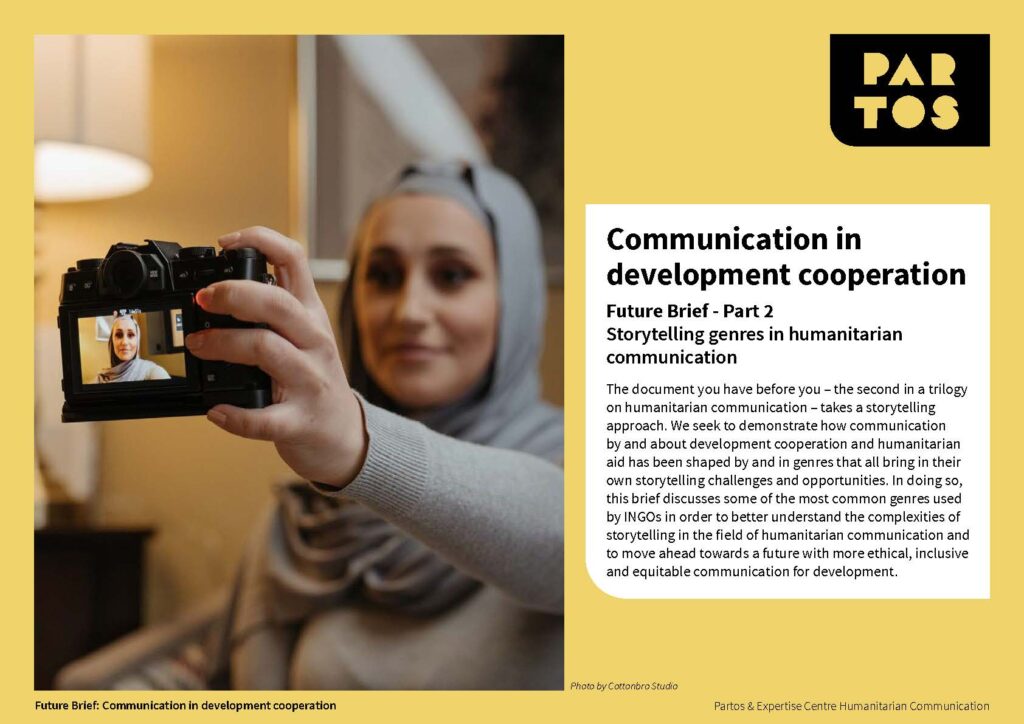
Future Brief #1- The history of communication by and about development cooperation
This Future Brief takes both a historical and cultural approach. We will demonstrate how communication by and about development cooperation and humanitarian aid is part and parcel of the unequal power relations established by colonialism and development. In doing so, this brief discusses the history and the current debate on humanitarian communication in order to understand the present and move ahead towards a future with more ethical, inclusive and equitable communication. It looks into language, meaning and power, the imagery debate, communication codes, stereotypes and provides a wide range of resources.
Language is part of a cycle that retains and reinforces historically rooted unequal power relations, which are often expressed and reinforced in colonialist, racist, sexist and other forms of oppressive practices.

Download Future Brief (Pt. 1) | The history of communication by and about development cooperation
DownloadFuture Brief #2 – Storytelling genres in humanitarian communication
This Future Brief explores how communication by and about development cooperation and humanitarian aid has been shaped by and in genres that all bring in their own storytelling challenges and opportunities. In doing so, this brief discusses some of the most common genres used in the sector in order to better understand the complexities of storytelling and what are, then, the solutions to these storytelling challenges in humanitarian communication? How can we make our campaigns more ethical, inclusive and equitable? The answers to these questions must be sought in a practice of communication in which values such as solidarity, equality and justice are made central. Campaigns that are steeped in the complexity, history and politics, and based on the agency, dignity and humanity of vulnerable people in the global South, are able to contribute to a more just global society. Particularly, two umbrella strategies could be used in the pursuit of ethical, inclusive and equitable communication: postcolonial criticism and participatory storytelling.
…all those involved in communication for development should be equipped with a postcolonial
perspective and assess each campaign from this perspective.
Download Future Brief (Pt. 2) | Storytelling genres in development cooperation
DownloadFuture Brief (Pt. 3) | Communication in development cooperation
This is the third and final Future Brief in the trilogy about humanitarian communication. Here, we discuss the role of production processes in humanitarian communication and highlight how not only representations, but also productions of international solidarity can become more ethical, inclusive, and equitable. We propose three modes of shifting the power in content production: on the level of INGOs and their partner organisations (the institutional mode); on the level of (the work of) creative agencies, artists, and professionals who are close to the projects that are represented (the creative mode); and, finally, on the level of civil society organisations, community activists and ordinary citizens activists who are part of the projects (the civic mode).
While working with locally-based professionals sounds (and is) promising, it might, at kleast at first, be easier said than done. […] However, it can and should be done.

Future Brief (Pt. 3) | Communication in development cooperation
DownloadJoin the CoP on Inclusive Communication
In the Community of Practice (CoP) – Inclusive Communication Partos and partners strive to make an inclusive, just and sustainable world by implementing communication. The aim of this CoP is to explore in which ways we can make our communication more ethical, inclusive and just in all senses.
If you are interested in co-creating discussions and learning sessions on inclusive communications, please contact Sera Koolmees. Together with The Expertise Centre of Humanitarian Communication, Partos will facilitate this CoP. Our intention is to get together once per month and create an online space for sharing and learning. Feel free to join if you are a member, partner organisation or specialist working on this matter. By sending an email to Sera Koolmees (sera@partos.nl) you will receive an invitation to upcoming sessions.
Image source: Chris Hardy
